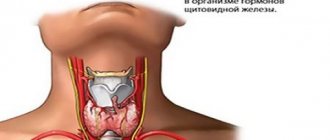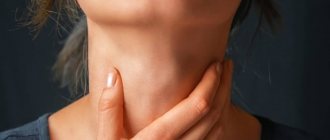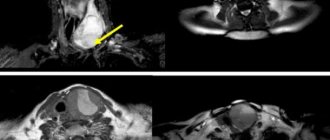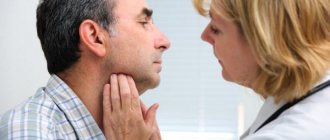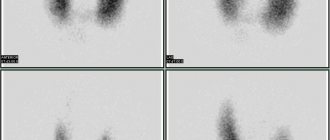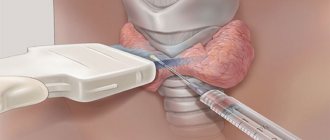Patient preparation rules
Standard conditions (unless otherwise determined by the doctor):
For 3 days, exclude angiography with fluorescein contrast, stop taking biotin preparations, multivitamins, dietary supplements for hair, nails, and skin. Eliminate physical activity and stress 24 hours in advance. Fast for 8 hours and eliminate fatty foods. You can drink water. Biomaterial is accepted in accordance with the schedule for taking biomaterial in the ML department of DILA.
You can add this study to your cart on this page
Detailed description of the study
A comprehensive study, which allows us to identify hypo- and hyperfunction of the thyroid gland, diagnose its autoimmune lesion and determine the need for further examination, is also used to monitor the effectiveness of the therapy.
Screening examination of the hormonal level of the thyroid gland, as well as assessment of the condition and activity of the thyroid gland. Additionally recommended: T3 total, T4 total, Calcitonin, as well as a General blood test with leukocyte formula.
The thyroid gland is a vital endocrine organ located on the front surface of the neck below the cartilage of the larynx. It synthesizes, accumulates and secretes thyroid hormones - triiodothyronine (T3) and thyroxine (T4), which regulate metabolic, energy and heat exchange processes in the body. The level of secretion of thyroid hormones is regulated by the hypothalamic-pituitary system, and also depends on the intake of iodine in the body. With reduced concentrations of the hormones T4 and T3 in the blood, the hypothalamus is stimulated and thyrotropin-releasing hormone (thyrotropin-releasing hormone) is produced, which increases the production of thyroid-stimulating hormone (TSH) in the pituitary gland. TSH enhances the synthesis and secretion of thyroid hormones by the thyroid gland. With an increase in the concentration of thyroxine and triiodothyronine in the blood, the production of TSH in the central endocrine organs slows down. These regulatory mechanisms maintain normal levels of thyroid hormones in the body.
With pathology of the thyroid gland or the hypothalamic-pituitary system, the level of thyroid hormones increases or decreases, metabolic processes are disrupted, and as a result, many organs and systems of the body can be affected. Elevated levels of T3 and T4 in the blood are a sign of hyperthyroidism or thyrotoxicosis (hyperthyroidism).
With hyperthyroidism , rapid heartbeat, weight loss, irritability, nervousness, hand tremors, and sleep disturbances are observed.
With hypothyroidism (low levels of thyroid hormones), bradycardia, weight gain, dry skin, hair loss, constipation, chilliness, fatigue, lethargy, and depression are noted. Severe hypothyroidism (myxedema) can lead to heart failure and coma. In children, it causes cretinism - delayed physical and mental development. Thyroid dysfunction (hypothyroidism or thyrotoxicosis) is more common in women than in men. Often this pathology first appears during pregnancy, during the newborn period, or at 40-50 years of age. Since the function of the thyroid gland is closely connected with the work of the nervous, cardiovascular, reproductive and other systems of the body, its disruption without timely diagnosis and adequate treatment can lead to myocarditis, heart failure, infertility and neurological disorders.
Interference:
- TSH level: Amiodarone, benserazide, haloperidol, lithium, analgin, beta-blockers (atenolol, metoprolol, propranolol), calcitonin, metoclopramide, lovastatin, methimazole, morphine, phenothiazines, rifampicin, 131I, physical activity. Free T4 level - amiodarone, propranolol, furosemide, amphetamines, heparin, danazol, valproic acid, aspirin, erythropoietin. Free T3 levels are increased by dextrothyroxine.
- TSH level: Bromocriptine, carbamazepine, corticosteroids, dopamine, heparin (iv), levodopa, phentolamine, somatostatin, octreotide, thyroxine, triiodothyronine, iodides, beta-agonists, the presence of autoantibodies to TSH. Interference between the use of fluorescein angiographic contrast and the values of thyroid-stimulating hormone determined in blood samples if the collection of these samples occurred within a period of time up to 72 hours after the administration of the contrast. In blood samples containing residual amounts of fluorescein, falsely low TSH results (less than 0.01 ml IU/l) may be observed, which is important in the process of monitoring patients operated on for thyroid cancer and receiving suppressive doses of thyroxine. Free T4 level: phenobarbital, glucocorticoids, dopamine, sulfonamides, sulfonylurea derivatives, anticonvulsants (carbamazepine, phenytoin), methadone, rifampicin, ranitidine. Level T3 is free. reduce phenytoin, propranalol, valproic acid, heparin. Increase or decrease depending on the dose - iodine-containing drugs, amiodarone.
Blood test for antibodies to thyroid proteins
What it is. A venous blood test that measures the level of antibodies to thyroid proteins in a sample. These tests make it possible to identify not only the fact of problems with the thyroid gland, but also to clarify their real cause.
According to Zili Kalmykova, endocrinologists prescribe a test for antibodies to thyroglobulin to assess the risk of relapse after radical treatment of certain thyroid diseases. For example, to exclude recurrence of thyroid cancer after its removal.
How it works. TSH is a protein produced by thyroid cells. Thyroid peroxidase is an enzyme found inside the cells of the thyroid gland, and thyroid-stimulating hormone receptors are proteins through which the thyroid gland receives orders from the pituitary gland. And antibodies are protective proteins that destroy viruses, microbes and cancer cells. If antibodies to thyroid proteins appear in a person’s blood, this means that its cells are being attacked by its own immune system.
Why is it prescribed? To distinguish autoimmune hypo- or hyperthyroidism from a disease associated with other causes - for example, iodine deficiency or deficiency.
How to understand the results. Normally, antibodies to the thyroid gland should not exceed 50 IU/ml. If their number increases, things are wrong.
If the number of antibodies to TSH increases, this may indicate chronic Hashimoto's thyroiditis, hypothyroidism, diffuse toxic goiter, and sometimes some rare autoimmune diseases such as pernicious anemia. However, sometimes the level of antibodies can increase, including in healthy people - for example, in elderly women.
If the number of antibodies to thyroid peroxidase increases, this may indicate Hashimoto's thyroiditis, diffuse toxic goiter, neonatal hyperthyroidism, congenital hypothyroidism, postpartum thyroiditis, euthyroid goiter. The level of these antibodies can also increase in other diseases - for example, in idiopathic hypothyroidism, adenoma and thyroid cancer. And also for all types of autoimmune diseases, including rheumatoid arthritis, systemic lupus erythematosus, insulin-dependent diabetes mellitus, autoimmune adrenal insufficiency and pernicious anemia. Antibody levels may increase in 5% of healthy men and women.
If the level of antibodies to TSH receptors increases, this may indicate thyroid atrophy, hypothyroidism, diffuse toxic goiter, euthyroid goiter, acute and subacute thyroiditis, neonatal hyperthyroidism and congenital hypothyroidism. However, antibody levels may increase during a viral infection.
Although a blood test for antibodies to thyroid proteins really helps to clarify the diagnosis, it will not be possible to figure it out without the help of a doctor - after all, there are too many possible options.
Interpretation:
- Thyroid-stimulating hormone - Primary hypothyroidism, TSH-secreting pituitary tumor, ectopic secretion of TSH (tumors of the lung, breast), resistance to thyroid hormones, severe somatic and mental illnesses, preeclampsia, hemodialysis, physical activity. Free T4 - Hyperthyroidism; overdose of thyroxine, decreased level or binding capacity of thyroxine-binding globulin, chronic liver and kidney diseases, obesity. Level T3free. - hyperthyroidism, T3 thyrotoxicosis, peripheral resistance syndrome to thyroid hormones, decreased levels of thyroxine-binding globulin, chronic liver and kidney diseases, hemodialysis, estrogen intake (increased or normal), oral contraceptives.
- Thyroid-stimulating hormone - Primary hyperthyroidism, secondary hypothyroidism, subclinical hyperthyroidism, autonomous secretion of thyroid hormones, exogenous thyroid hormone therapy, severe general diseases in old age, fasting, psychological stress. Free T4 - Hypothyroidism; overdose of thyreostatics, against the background of iodine deficiency, after operations on the thyroid gland, in drug addicts. Level T3 is free. - hypothyroidism, severe somatic and mental illnesses, sudden weight loss, heavy physical activity, primary adrenal insufficiency.
Blood test for free thyroxine
What it is. A venous blood test in which the concentration of free thyroxine (T4) is determined in the sample. Most often, an analysis is prescribed if the TSH test results are higher or lower than normal.
According to Zili Kalmykova, T4 is a hormone produced by the thyroid gland itself. It increases the speed of many cellular metabolic reactions - for example, the breakdown of fats and carbohydrate metabolism.
How it works. Information about how much free T4 a person has in his blood allows us to clarify the stage of the disease. In the body, T4 is present in two forms: inactive, that is, associated with the protein thyroxine binding globulin (TBG), and active, that is, not associated with TSG. Free T4 analysis is prescribed for a more detailed assessment of thyroid status. For example, to diagnose hypothyroidism or hyperthyroidism syndrome.
Why is it prescribed? To figure out whether a person is sick or is just at risk. For example, if a person has an elevated TSH level but a normal T4 level, then he or she is at risk of developing hypothyroidism. And if he has a high TSH level and a low T4 level, the disease has already developed.
How to understand the results. Both in our country and abroad, the norm for free T4 is 12-30 pmol/l. However, a person may have symptoms of hyperthyroidism or hypothyroidism even if free T4 is within normal limits. To avoid mistakes, this analysis is usually prescribed together with TSH - it turns out to be much more informative.
What test results may indicate:
- TSH is slightly elevated, but free T4 is normal - mild thyroid deficiency, which can develop into hypothyroidism. As a rule, in this situation, an additional test for antibodies to the thyroid gland is prescribed. This allows you to understand whether a person needs immediate treatment.
- TSH is high, free T4 is low - hypothyroidism requiring treatment.
- TSH is low, free T4 is low - secondary hypothyroidism associated with insufficiency of the pituitary gland, or the result of a serious disease not related to the thyroid gland.
- TSH is low, free T4 is high - hyperthyroidism requiring treatment.
If desired, anyone who is interested in the health of their thyroid gland can take a TSH and T4 test. It is important to remember that you cannot diagnose yourself, much less prescribe treatment, on your own.
In addition, both hypothyroidism and hyperthyroidism can have many causes - from a lack or, on the contrary, excess of iodine in food to tumors or autoimmune diseases. Only a doctor can figure out what exactly is happening to the patient during a personal appointment.


